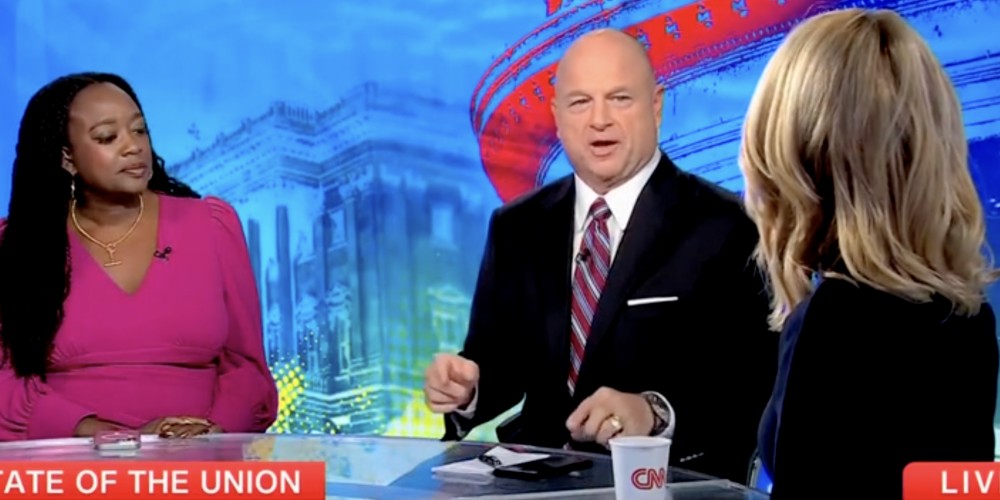![]() (DCNF)—Panelists on CNN clashed Sunday immediately after GOP strategist and senior political commentator David Urban called out Vice President Kamala Harris for having a “terrible” week.
(DCNF)—Panelists on CNN clashed Sunday immediately after GOP strategist and senior political commentator David Urban called out Vice President Kamala Harris for having a “terrible” week.
Despite Harris having a full week of sit-down interviews with the media, polls have shown former President Donald Trump and Harris nearly deadlocked in key swing states. On CNN’s “State of the Union,” Urban criticized Harris’ week, noting how fellow lawmakers, like Democratic Michigan Gov. Gretchen Whitmer, received major backlash online after releasing an unusual, staged video with MSNBC columnist Liz Plank.
“She had a terrible week. It was a terrible week for the Harris campaign. You had Gretchen Whitmer having to apologize to Catholics across America for mocking them with some Dorito, bizarro Dorito thing on there. You had governor Elmer Fudd out hunting and not knowing how to load his shotgun using the wrong gun, at the same time — ” Urban said.
“At the same time, you have Barack Obama in Pennsylvania where he derided people who own guns. Remember? Claiming people in Pennsylvania were bitter and they cling to guns and religion,” Urban continued. “Remember that in 2008? So they’re trying to appeal to those folks at the same time while he alienates black male voters by chastising. So they had a really tough week.”
However, Democratic strategist Doug Thornell intervened and pushed back against Urban, criticizing Trump’s performance and noting that Harris’ positive for the week was releasing her medical records.
“So first of all, Kamala Harris released her medical records, Trump hasn’t. That was this week,” Doug Thornell said. “He goes to Detroit and insults an entire city and insults a lot of black people there. His economic plan came out and by outside economic analysis, they said it would raise costs and raise debt on the American people. So Trump didn’t really have a great week either. I think many times he goes out there — ”
“[Releasing] medical records, that’s the high point of your week? You’re really grasping at straws,” Urban interrupted.
WATCH:
Thornell continued to push back against Urban, questioning whether Pennsylvania voters still remember former President Barack Obama’s 2008 comment to them, before CNN’s Scott Jennings joined the argument.
“I don’t think if I were in your party, with all due respect, I wouldn’t want to be arguing about the hiding of medical conditions and medical records, given who the current president of the United States is,” Jennings hit back.
While Thornell criticized Trump in response, Jennings asked to finish his statement and continued to call out Harris for dropping poll numbers.
“Number two, I think the polling this morning and the week, I think David’s right. It was a rough week. I mean, her faves are down. They’re struggling with — I mean, the front page of The New York Times this morning, front-page story, Democrats struggling with African American voters, particularly African American men,” Jennings said.
“This gender gap issue is real. It’s a real problem and you see the Democrats reacting to it. I think what they are now finally in October — the election — coming to realize is that a lot of men think Democrats care more about dudes who want to become women than dudes who just want to be dudes. No hunting, cosplay or cringey videos is going to change it — the bed is made,” Jennings concluded.
NBC News’ latest national poll shows Harris and Trump in a deadlock just three weeks before Election Day, with each receiving 48% support.
In recent weeks, political pundits have warned the Democratic Party about the former president’s appeal to key Democratic voting blocs. The latest New York Times poll, released Sunday, shows Harris trailing by six points among Hispanic voters compared to President Joe Biden’s 2020 election results. The former president has also gained support among black voters, with New York Times polling data showing him receiving 15% support, up from 9% in 2020.
Featured Image: Screenshot/CNN/”State of the Union”
All content created by the Daily Caller News Foundation, an independent and nonpartisan newswire service, is available without charge to any legitimate news publisher that can provide a large audience. All republished articles must include our logo, our reporter’s byline and their DCNF affiliation. For any questions about our guidelines or partnering with us, please contact [email protected].



